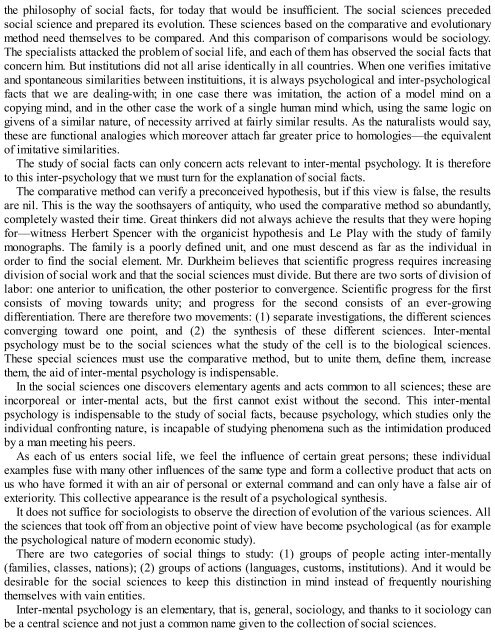3658925934
Create successful ePaper yourself
Turn your PDF publications into a flip-book with our unique Google optimized e-Paper software.
the philosophy of social facts, for today that would be insufficient. The social sciences preceded<br />
social science and prepared its evolution. These sciences based on the comparative and evolutionary<br />
method need themselves to be compared. And this comparison of comparisons would be sociology.<br />
The specialists attacked the problem of social life, and each of them has observed the social facts that<br />
concern him. But institutions did not all arise identically in all countries. When one verifies imitative<br />
and spontaneous similarities between instituitions, it is always psychological and inter-psychological<br />
facts that we are dealing-with; in one case there was imitation, the action of a model mind on a<br />
copying mind, and in the other case the work of a single human mind which, using the same logic on<br />
givens of a similar nature, of necessity arrived at fairly similar results. As the naturalists would say,<br />
these are functional analogies which moreover attach far greater price to homologies—the equivalent<br />
of imitative similarities.<br />
The study of social facts can only concern acts relevant to inter-mental psychology. It is therefore<br />
to this inter-psychology that we must turn for the explanation of social facts.<br />
The comparative method can verify a preconceived hypothesis, but if this view is false, the results<br />
are nil. This is the way the soothsayers of antiquity, who used the comparative method so abundantly,<br />
completely wasted their time. Great thinkers did not always achieve the results that they were hoping<br />
for—witness Herbert Spencer with the organicist hypothesis and Le Play with the study of family<br />
monographs. The family is a poorly defined unit, and one must descend as far as the individual in<br />
order to find the social element. Mr. Durkheim believes that scientific progress requires increasing<br />
division of social work and that the social sciences must divide. But there are two sorts of division of<br />
labor: one anterior to unification, the other posterior to convergence. Scientific progress for the first<br />
consists of moving towards unity; and progress for the second consists of an ever-growing<br />
differentiation. There are therefore two movements: (1) separate investigations, the different sciences<br />
converging toward one point, and (2) the synthesis of these different sciences. Inter-mental<br />
psychology must be to the social sciences what the study of the cell is to the biological sciences.<br />
These special sciences must use the comparative method, but to unite them, define them, increase<br />
them, the aid of inter-mental psychology is indispensable.<br />
In the social sciences one discovers elementary agents and acts common to all sciences; these are<br />
incorporeal or inter-mental acts, but the first cannot exist without the second. This inter-mental<br />
psychology is indispensable to the study of social facts, because psychology, which studies only the<br />
individual confronting nature, is incapable of studying phenomena such as the intimidation produced<br />
by a man meeting his peers.<br />
As each of us enters social life, we feel the influence of certain great persons; these individual<br />
examples fuse with many other influences of the same type and form a collective product that acts on<br />
us who have formed it with an air of personal or external command and can only have a false air of<br />
exteriority. This collective appearance is the result of a psychological synthesis.<br />
It does not suffice for sociologists to observe the direction of evolution of the various sciences. All<br />
the sciences that took off from an objective point of view have become psychological (as for example<br />
the psychological nature of modern economic study).<br />
There are two categories of social things to study: (1) groups of people acting inter-mentally<br />
(families, classes, nations); (2) groups of actions (languages, customs, institutions). And it would be<br />
desirable for the social sciences to keep this distinction in mind instead of frequently nourishing<br />
themselves with vain entities.<br />
Inter-mental psychology is an elementary, that is, general, sociology, and thanks to it sociology can<br />
be a central science and not just a common name given to the collection of social sciences.









![Genki - An Integrated Course in Elementary Japanese II [Second Edition] (2011), WITH PDF BOOKMARKS!](https://img.yumpu.com/58322134/1/180x260/genki-an-integrated-course-in-elementary-japanese-ii-second-edition-2011-with-pdf-bookmarks.jpg?quality=85)
![Genki - An Integrated Course in Elementary Japanese I [Second Edition] (2011), WITH PDF BOOKMARKS!](https://img.yumpu.com/58322120/1/182x260/genki-an-integrated-course-in-elementary-japanese-i-second-edition-2011-with-pdf-bookmarks.jpg?quality=85)





